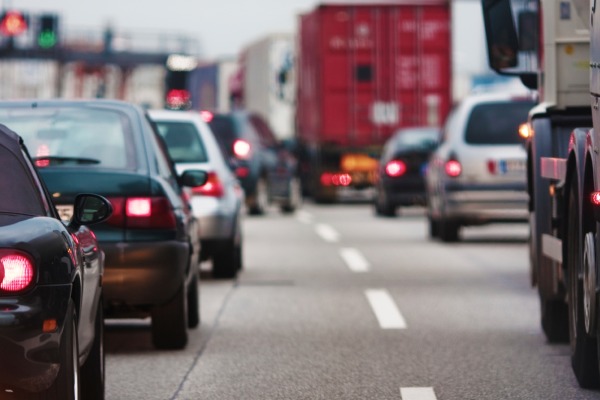
Are you tired of wasting time in rush-hour commuting? Are you jealous of drivers in the carpool lane, as they speed past you, the poor soul stuck in stop-and-go traffic? Carpools can provide you with one less reason to declare in frustration that there should be more hours in the day.
Time and Money
Commuter carpools save time by letting drivers use the carpool or high-occupancy vehicle (HOV) lane. By avoiding the congested lanes, carpoolers have a more streamlined and timely commute than solo drivers. According to the 2012 Urban Mobility Report, the average rush-hour commuter spends an extra 38 hours in traffic each year, up from 16 extra hours in 1982.
Carpooling can also save money: If you're the driver, you can lower the cost of gas by splitting the bill with passengers. Indeed, 33 percent of drivers in a survey by AAA said that they were carpooling to offset the increasing gas prices. According to the U.S. Energy Information Administration, the average cost for a gallon of regular gasoline in the U.S. was $3.64 in July 2013. AAA further estimates that operating costs (maintenance, fuel, insurance, tires and depreciation) for a sedan average 60.8 cents per mile or $9,122 per year. If driver and passengers agree to split some of these costs, everyone benefits.
(To figure out the specific costs for your car, use Edmunds' True Cost to Own® (TCO®) tool, which can calculate other costs such as insurance, depreciation and maintenance.)
Many companies offer incentives for employees who carpool. Nike has implemented a carpooling program that gives employees a chance to win drawings for gift cards. Some companies, including Edmunds.com, reimburse employees for the cost of a monthly parking space if they use alternative means of transportation.
Francis Girard-Boudreault, marketing and communication coordinator at CarpoolingNetwork.com, is sold on carpooling for a number of reasons. "Like many others, I have been using carpooling for years for my long-distance trips," he says. "It gives me the opportunity to meet new and exceptional people, plus it's cheaper than a bus ticket and more fun, too," he says. Because he doesn't own a car, Girard-Boudreault estimates he saves $8,000 in annual expenses.
How To Find a Carpool
CarpoolingNetwork.com offers a free online platform for drivers and passengers to meet and plan carpooling for their daily commutes or long-distance trips. The Web site has approximately 50 affiliated partners and more than 67,000 users across Canada and the United States. It offers an online tool that calculates potential savings from carpooling in a specified area.
In addition to CarpoolingNetwork.com, there are a number of Web sites that offer free listings and matching systems, including Zimride, eRideShare and Carma. Many online ride-sharing programs also have apps for smartphones, which can be convenient for finding a quick ride. Carma keeps safety in mind, with the ability to browse user reviews and view photos of the carpoolers. Zimride links carpoolers' profiles with their Facebook profiles to match people up based on interests and recommendations from past carpoolers.
Rules of the Road
Should you decide to organize or participate in a carpool, here are some general guidelines from eRideShare.com:
Unplanned Carpooling
A successful carpool requires structure. But not everyone is willing or able to commit themselves to scheduled pickup and drop-off times. Carpoolers of this type in Washington, D.C. and San Francisco have developed a carpool system called "slugging." Also called "instant" or "casual" carpooling, slugging allows commuters (known as "body snatchers" in slugging parlance) to pick up total strangers ("slugs") at the last minute, in order to meet the express lanes' minimum passenger requirements.
The pickup sites are well-known, so drivers and passengers can join up in convenient locations on their way to work. Slugging, which traces its roots back to the 1970s Arab oil embargo, isn't about saving money. It's about saving time. No commitment required.
Jump in the Pool?
It's important for you to weigh the benefits and costs associated with carpooling before making a decision. Keep safety in mind and think about whether you're going to be happy riding with others — particularly at the crack of dawn. If you do decide that carpooling is for you, you can plan what you'll do with the 38 hours a year that you just got back.